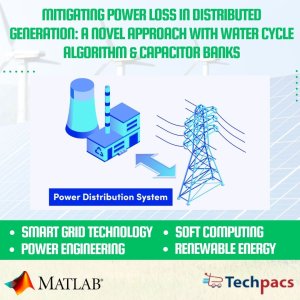Efficient Energy Harvesting from Solar Panels:MDE-FISPIS-Based MPPT for Optimal Output Maximization.
Problem Definition
The problem of Maximum Power Point Tracking (MPPT) in solar power generation systems is a critical issue that has been addressed through numerous techniques in recent years. However, the existing models suffer from various limitations that hinder their performance. Traditional power generation systems were highly susceptible to variations, impacting their overall efficiency. To address this challenge, many researchers have turned to optimization-based methods to retrieve the Maximum Power Point (MPP). However, these optimization algorithms often exhibit slow convergence rates and are prone to getting trapped in local minima, making the systems unreliable and non-robust.
As a result, the process of extracting MPP becomes complex and challenging, leading to an elongated processing time. Therefore, there is a pressing need for a new and effective MPPT approach that can overcome these limitations and provide a more reliable and efficient solution for solar power systems.
Objective
The objective of this study is to develop a new Maximum Power Point Tracking (MPPT) approach that addresses the limitations of existing techniques in solar power generation systems. The proposed approach integrates a Fuzzy Inference System (FIS), a PID controller, and a Modified Differential Evolution (MDE) algorithm to enhance the efficiency and effectiveness of renewable energy sources (RES). By combining these components, the aim is to improve the traditional MPPT technique by quickly responding to changing solar radiation, reducing power loss and oscillations, and optimizing fuzzy logic parameters through the MDE algorithm. The goal is to develop a more reliable and robust MPPT system that can operate efficiently under diverse scenarios, including with an electric vehicle (EV) as a load.
Proposed Work
In this work, our objective is to address the limitations of existing Maximum Power Point Tracking (MPPT) techniques by proposing a novel approach that combines a Fuzzy Inference System (FIS), a PID controller, and a Modified Differential Evolution (MDE) algorithm. By integrating these components, we aim to improve the effectiveness and efficiency of renewable energy sources (RES) in generating power to meet the increasing demand for energy. The first stage of our proposed work focuses on enhancing the traditional MPPT technique by incorporating the FIS and PID controller, which respond quickly to changing solar radiation and help reduce power loss and oscillations. Furthermore, we plan to optimize the parameters of the fuzzy logic system by utilizing the Modified Differential Evolution (MDE) algorithm, which is enhanced with the Levy flying technique to achieve more effective results. By adapting the fuzzy logic parameters through optimization, we aim to enhance the overall performance of the MPPT system and enable it to operate more efficiently.
Additionally, we seek to validate the proposed model's performance not only with resistive loads as done in previous studies, but also with an electric vehicle (EV) as a load, to assess its effectiveness in diverse scenarios. Through this comprehensive approach, we aim to develop a new MPPT technique that overcomes the limitations of existing models and provides a more reliable and robust solution for maximizing power generation from RES.
Application Area for Industry
This project can find applications in various industrial sectors, including but not limited to renewable energy, automotive, and electrical industries. The proposed MPPT approach addresses the limitations of traditional models by combining Fuzzy Inference System with PID controller and Modified Differential Evolution. By implementing this solution, industries can enhance the capacity of renewable energy sources to generate power, leading to increased efficiency and effectiveness in power generation. The optimization techniques utilized in the proposed approach help in faster response to changing solar radiation, minimizing power loss, operating time, and oscillations. Additionally, the validation of the model's performance using electric vehicles as loads showcases its versatility and applicability in different industrial domains.
Overall, the benefits of implementing these solutions include improved system processing time, enhanced performance, and increased reliability in extracting MPP across diverse industrial sectors.
Application Area for Academics
The proposed project on combining Fuzzy Inference System with PID controller and Modified Differential Evolution for Maximum Power Point Tracking (MPPT) in renewable energy sources can significantly enrich academic research, education, and training in the field of renewable energy systems and optimization techniques. This project addresses the limitations of traditional MPPT techniques by introducing a novel approach that aims to enhance the capacity of renewable energy sources to generate power efficiently. The combination of Fuzzy Inference System, PID controller, and Modified Differential Evolution algorithm offer a robust solution that optimizes the fuzzy logic parameters for higher efficacy. The relevance of this project lies in its potential applications for researchers, MTech students, and PHD scholars in the field of renewable energy systems, optimization algorithms, and control systems. The code and literature of this project can be utilized by researchers to explore innovative research methods, conduct simulations, and analyze data within educational settings.
The use of algorithms such as Fuzzy logic, PID, DE, and Levy flights provides a comprehensive platform for developing advanced MPPT techniques for renewable energy systems. The proposed work not only contributes to the advancement of research in renewable energy systems but also offers a practical solution for optimizing power generation from renewable sources. By validating the model's performance with resistive loads and electric vehicles as loads, this project opens up new possibilities for enhancing the efficiency and effectiveness of MPPT techniques in real-world applications. Future scope of this project includes further optimization of the proposed MPPT technique, implementation of the model in practical renewable energy systems, and exploration of its performance in diverse environmental conditions. This project lays the foundation for future research and innovation in the field of renewable energy systems optimization, benefiting academia, industry, and society as a whole.
Algorithms Used
Fuzzy Logic, PID, DE, and Levy flights are the algorithms used in the project for a unique and effective Maximum Power Point Tracking (MPPT) approach. The Fuzzy Logic and PID controller are combined in the first stage to enhance the MPPT technique's efficiency. The Fuzzy Inference System (FIS) and PID controller help in quick response to changes in solar radiation and reduce power loss, operating time, and oscillations. In the second stage, the Modified Differential Evolution (MDE) algorithm, which is modified by combining it with Levy flights, is used to optimize the fuzzy logic's parameters for highly effective results. This optimization technique helps expand the capacity of renewable energy sources to generate power to meet rising load demands.
The proposed work aims to improve accuracy and efficiency in MPPT systems by combining these algorithms to achieve better performance under different load conditions, including electric vehicles.
Keywords
SEO-optimized keywords: Solar system, Photovoltaic system, Maximum Power Point Tracking, MPPT, FISPID, Fuzzy Inference System, Proportional-Integral-Derivative control, Differential Evolution algorithm, Optimization, Energy management, Renewable energy integration, Solar energy, Energy efficiency, Energy harvesting, Energy conversion, Hybrid energy systems, Power electronics, Artificial intelligence.
SEO Tags
Solar system, Photovoltaic system, Maximum Power Point Tracking, MPPT, FISPID, Fuzzy Inference System, Proportional-Integral-Derivative control, Differential Evolution algorithm, Optimization, Energy management, Renewable energy integration, Solar energy, Energy efficiency, Energy harvesting, Energy conversion, Hybrid energy systems, Power electronics, Artificial intelligence
| Shipping Cost |
|
No reviews found!

















































No comments found for this product. Be the first to comment!